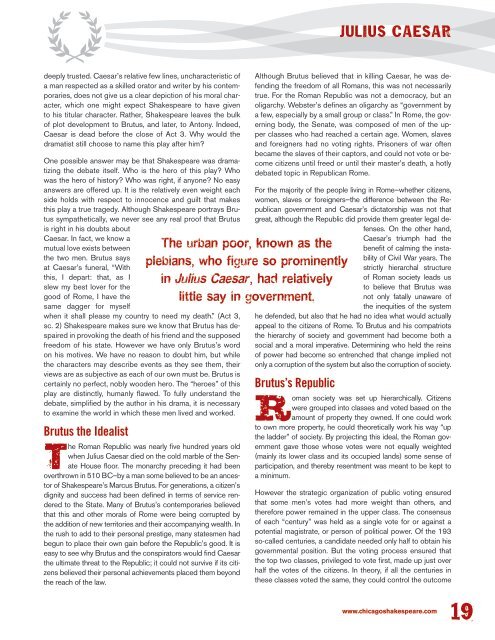Julius Caesar • 2013 - Chicago Shakespeare Theater
Julius Caesar • 2013 - Chicago Shakespeare Theater
Julius Caesar • 2013 - Chicago Shakespeare Theater
Create successful ePaper yourself
Turn your PDF publications into a flip-book with our unique Google optimized e-Paper software.
deeply trusted. <strong>Caesar</strong>’s relative few lines, uncharacteristic of<br />
a man respected as a skilled orator and writer by his contemporaries,<br />
does not give us a clear depiction of his moral character,<br />
which one might expect <strong>Shakespeare</strong> to have given<br />
to his titular character. Rather, <strong>Shakespeare</strong> leaves the bulk<br />
of plot development to Brutus, and later, to Antony. Indeed,<br />
<strong>Caesar</strong> is dead before the close of Act 3. Why would the<br />
dramatist still choose to name this play after him?<br />
One possible answer may be that <strong>Shakespeare</strong> was dramatizing<br />
the debate itself. Who is the hero of this play? Who<br />
was the hero of history? Who was right, if anyone? No easy<br />
answers are offered up. It is the relatively even weight each<br />
side holds with respect to innocence and guilt that makes<br />
this play a true tragedy. Although <strong>Shakespeare</strong> portrays Brutus<br />
sympathetically, we never see any real proof that Brutus<br />
is right in his doubts about<br />
<strong>Caesar</strong>. In fact, we know a<br />
mutual love exists between<br />
the two men. Brutus says<br />
at <strong>Caesar</strong>’s funeral, “With<br />
this, I depart: that, as I<br />
slew my best lover for the<br />
good of Rome, I have the<br />
same dagger for myself<br />
when it shall please my country to need my death.” (Act 3,<br />
sc. 2) <strong>Shakespeare</strong> makes sure we know that Brutus has despaired<br />
in provoking the death of his friend and the supposed<br />
freedom of his state. However we have only Brutus’s word<br />
on his motives. We have no reason to doubt him, but while<br />
the characters may describe events as they see them, their<br />
views are as subjective as each of our own must be. Brutus is<br />
certainly no perfect, nobly wooden hero. The “heroes” of this<br />
play are distinctly, humanly flawed. To fully understand the<br />
debate, simplified by the author in his drama, it is necessary<br />
to examine the world in which these men lived and worked.<br />
Brutus the Idealist<br />
The Roman Republic was nearly five hundred years old<br />
when <strong>Julius</strong> <strong>Caesar</strong> died on the cold marble of the Senate<br />
House floor. The monarchy preceding it had been<br />
overthrown in 510 BC–by a man some believed to be an ancestor<br />
of <strong>Shakespeare</strong>’s Marcus Brutus. For generations, a citizen’s<br />
dignity and success had been defined in terms of service rendered<br />
to the State. Many of Brutus’s contemporaries believed<br />
that this and other morals of Rome were being corrupted by<br />
the addition of new territories and their accompanying wealth. In<br />
the rush to add to their personal prestige, many statesmen had<br />
begun to place their own gain before the Republic’s good. It is<br />
easy to see why Brutus and the conspirators would find <strong>Caesar</strong><br />
the ultimate threat to the Republic; it could not survive if its citizens<br />
believed their personal achievements placed them beyond<br />
the reach of the law.<br />
The urban poor, known as the<br />
plebians, who figure so prominently<br />
in , had relatively<br />
little say in government.<br />
JULIUS CAESAR<br />
Although Brutus believed that in killing <strong>Caesar</strong>, he was defending<br />
the freedom of all Romans, this was not necessarily<br />
true. For the Roman Republic was not a democracy, but an<br />
oligarchy. Webster’s defines an oligarchy as “government by<br />
a few, especially by a small group or class.” In Rome, the governing<br />
body, the Senate, was composed of men of the upper<br />
classes who had reached a certain age. Women, slaves<br />
and foreigners had no voting rights. Prisoners of war often<br />
became the slaves of their captors, and could not vote or become<br />
citizens until freed or until their master’s death, a hotly<br />
debated topic in Republican Rome.<br />
For the majority of the people living in Rome–whether citizens,<br />
women, slaves or foreigners–the difference between the Republican<br />
government and <strong>Caesar</strong>’s dictatorship was not that<br />
great, although the Republic did provide them greater legal defenses.<br />
On the other hand,<br />
<strong>Caesar</strong>’s triumph had the<br />
benefit of calming the instability<br />
of Civil War years. The<br />
strictly hierarchal structure<br />
of Roman society leads us<br />
to believe that Brutus was<br />
not only fatally unaware of<br />
the inequities of the system<br />
he defended, but also that he had no idea what would actually<br />
appeal to the citizens of Rome. To Brutus and his compatriots<br />
the hierarchy of society and government had become both a<br />
social and a moral imperative. Determining who held the reins<br />
of power had become so entrenched that change implied not<br />
only a corruption of the system but also the corruption of society.<br />
Brutus’s Republic<br />
Roman society was set up hierarchically. Citizens<br />
were grouped into classes and voted based on the<br />
amount of property they owned. If one could work<br />
to own more property, he could theoretically work his way “up<br />
the ladder” of society. By projecting this ideal, the Roman government<br />
gave those whose votes were not equally weighted<br />
(mainly its lower class and its occupied lands) some sense of<br />
participation, and thereby resentment was meant to be kept to<br />
a minimum.<br />
However the strategic organization of public voting ensured<br />
that some men’s votes had more weight than others, and<br />
therefore power remained in the upper class. The consensus<br />
of each “century” was held as a single vote for or against a<br />
potential magistrate, or person of political power. Of the 193<br />
so-called centuries, a candidate needed only half to obtain his<br />
governmental position. But the voting process ensured that<br />
the top two classes, privileged to vote first, made up just over<br />
half the votes of the citizens. In theory, if all the centuries in<br />
these classes voted the same, they could control the outcome<br />
www chicagoshakespeare com<br />
19




